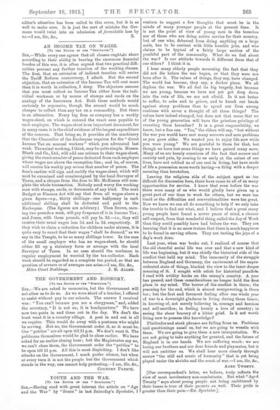AN INCOME TAX ON WAGES.
[To THE EDITOU Or TIM SPECTATOE...]
SIR.,—While every one agrees that all classes ought,to share according to their ability in bearing the enormous financial burden of this war, it is often argued that two practical diffi- culties prevent any further taxation of the working classes. The first, that an extension of indirect taxation will revive the Tariff Reform controversy, I admit. But the second objection, that an extension of the Income Tax will cost more than it is worth in collection, I deny. The objectors assume that you must collect an Income Tax either from the indi- vidual workman or by means of stamps and cards on the analogy of the Insurance Act. Both these methods would certainly be expensive, though the second would be much cheaper to collect than any tax on a commodity. But there is an alternative. Every big firm or company has a weekly wages-sheet, on which is entered the exact sum payable to each employee. The wages-sheet is an. important document, for in many cases it is the chief evidence of the largest expenditure of the concern. That being so, it provides all the machinery that the Chancellor of the Exchequer requires for the " direct Income Tax on manual workers" which you advocated last week. The actual working, I think, may be quite simple. Messrs. Blank and Co., Ltd., will add one column to their wages-sheet, giving the exact number of pence deducted from each employee whose wages are above the exemption line ; and be, of course, will receive his weekly pay menus that number of pence. The firm's cashier will sign and certify the wages-sheet, which will next be examined and countersigned by the local Surveyor of Taxes, and a cheque from the firm to Mr. McKenna will com- plete the whole transaction. Nobody need worry the working man with stamps, cards, or documents of any kind. The next Budget or Finance Act will say that from all wages above a given figure—e.g., thirty shillings—one halfpenny in each additional shilling shall be deducted and paid to the Exchequer. (The figures are arbitrary.) Then Brown, earn- ing two pounds a week, will pay fivepence of it in Income Tax ; and Jones, with three pounds, will pay is. 3d.—i.e., they will receive their usual wages less 5d. and Is. 3d. respectively. If they wish to claim a reduction for children under sixteen, it is quite easy to enact that their wages "shall be deemed," as we say in the Temple, to be so many shillings lower. In the case of the small employer who has no wages-sheet, he should either fill up a statutory form or arrange with the local Surveyor of Taxes. In no case should the workman in regular employment be worried by the tax-collector. Each week should be regarded as a complete tax period, so that no question of arrears or of averages can arise.—I am, Sir, &o.,


































 Previous page
Previous page